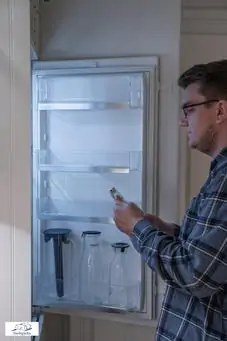Do you want to know how often should a refrigerator run to keep food fresh? When your fridge starts to run a lot or is always running, it may be struggling to keep your food cool. This can lead to spoiled or rotten food that will need to be replaced.
When you notice that your home refrigerator is running often think that something is wrong, there are some things that you can check to ensure that your fridge is running efficiently. Below are four factors to keep in mind when assessing your fridge’s run time.
1) Check if the coils are dirty
2) Check if the door gasket is damaged
3) Check the temperature settings
4) Clean the condenser coils regularly to ensure optimal efficiency.
What’s the Normal Refrigerator Run Time?
Refrigerators are one of the most important appliances in our homes, helping to keep our food fresh and preventing spoilage. But how often should a refrigerator run in order to keep food at its best?
On the one hand, newer refrigerators are generally designed to run more efficiently, with built-in sensors that automatically adjust the cooling cycle based on factors like a door opening frequency and environmental conditions.
On the other hand, if you live in a warm climate or your fridge is older, it may need to run more often in order to stay cool enough.
In general, you can expect your fridge to run a few times an hour. If it seems like it’s running constantly or the food inside isn’t staying fresh, there may be an issue that needs to be addressed.
How Long Should a Refrigerator Run Before Shutting Off?
Talking about the time a refrigerator should run, it is important to know that the compressor of the fridge takes more time to cool down. So, if we talk about a newly installed fridge, it will take some time before the compressor shuts off.
The frequency of the cycle also matters. A fridge with a higher frequency will have shorter cycles and will turn off more quickly. A fridge with a lower frequency will run for longer and take more time to cool down.
In general, the length of time that a refrigerator runs before shutting off depends on several factors, including the size and age of your fridge, as well as the environmental conditions where you live. In warmer climates or with older fridges, it may be necessary to keep your fridge running for longer periods of time.
What are the Signs of a Bad Refrigerator Compressor?
If your refrigerator isn’t cooling properly, one of the issues may be a bad compressor. The compressor is responsible for circulating the refrigerant throughout the fridge and helps to keep things cold.
There are a few signs that you may have a bad compressor, such as if your fridge is running constantly or if the food inside isn’t staying fresh. Other potential signs include unusual noises coming from the fridge, frozen coils, or a buildup of frost inside the unit.
If you are experiencing any of these issues with your refrigerator compressor, you may want to consult with a professional to have it serviced. In the meantime, you can take steps to help minimize the strain on your fridge, such as keeping the doors closed and adjusting the temperature settings.
How Often do Refrigerators Defrost?
Refrigerators all have different defrost cycles, depending on factors like the size and age of the fridge, as well as environmental conditions.
In general, newer refrigerators tend to defrost less often than older models, since they are more efficient and may not need to engage in a full defrost cycle as frequently.
What is the Lifespan of a Refrigerator?
Just like most appliances, refrigerators have a lifespan. The average lifespan of a refrigerator is around 13 years. However, this can vary depending on the make and model of your fridge, as well as how well it’s been maintained over the years.
There are a few things you can do to help extend the lifespan of your refrigerator, such as cleaning the coils and keeping the doors closed as much as possible. Additionally, you may want to consider investing in a fridge with a longer warranty, in case something does go wrong down the line.
While refrigerators are built to last, eventually they will need to be replaced. When it’s time for a new fridge, be sure to do your research to find the best option for your needs.
5 Most Likely Reasons Your Fridge is Constantly Running
Door gasket
If your refrigerator is running constantly, one of the most likely causes is a worn or damaged door gasket. The door gasket is responsible for creating an airtight seal around the fridge, and if it isn’t sealing properly, cold air may be escaping and the compressor will need to run more often to keep things cool.
Dirty condenser coils
Another potential reason for a fridge that seems to be running constantly is dirty condenser coils. The coils help to remove heat from the fridge, and if they are covered in dust or dirt, they won’t be as effective.
Faulty defrost thermostat
If your fridge has an issue with the defrost thermostat, it may cause the compressor to run more often than it should. The defrost thermostat is responsible for regulating the temperature inside the fridge, and if it isn’t working properly, the compressor will need to cycle on more frequently in order to keep things cool.
Faulty evaporator fan motor
If your refrigerator is not freezing and it has a faulty evaporator fan motor, it will not be able to circulate air properly throughout the freezer and fridge sections. This can result in food freezing inside the fridge, as well as warm spots in the freezer area.
Refrigerant leaks
If your refrigerator is leaking refrigerant, this may also cause it to run constantly. Refrigerant is necessary for the fridge to be able to cool properly, and if there is a leak, the compressor will need to work overtime to make up for the lost refrigerant.
Final Verdict – How Often Should a Refrigerator Run
I hope this guide has helped you enough to How Often Should A Refrigerator Run To Keep Food Fresh? Follow our blog to know more about information like this.



